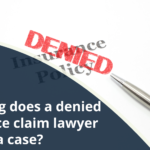If you’ve been injured in an accident that was not your fault, you may wonder what types of personal injury damages you can recover. The answer depends on the circumstances of your case, but in general, you may be able to recover economic and noneconomic damages.
Economic damages compensate you for quantifiable financial losses, such as medical bills, lost wages, and property damage. These might include pain and suffering, loss of enjoyment of life, and emotional distress. On the other hand, noneconomic damages are more difficult to quantify but can be just as important.
Read on to learn more about the types of damages you can recover in a personal injury case!
- Punitive Damages
Punitive damages are intended to punish the wrongdoer and deter future misconduct. They are awarded in addition to compensatory damages, which reimburse the plaintiff for their losses.
Punitive damages are often awarded in cases of gross negligence or intentional wrongdoing. To recover punitive damages, the plaintiff must usually show that the defendant’s conduct was especially reckless or harmful.
In some states, there are limits on the number of punitive damages awarded. For example, California caps punitive damages at three times the number of compensatory damages or $250,000, whichever is greater.
Punitive damages are not available in every personal injury case. Suppose you are entitled to punitive damages. In that case, you should speak to an experienced personal injury attorney who can evaluate your claim and advise you of your legal options.
The most important thing to remember is that punitive damages are not intended to compensate the plaintiff for their losses but rather to punish and deter certain wrongful conduct.
- Pain and Suffering
If you’ve been injured in an accident that was someone else’s fault, you may wonder what damages you can recover. One type of damage that may be available to you is pain and suffering.
Pain and suffering is a type of damage intended to compensate the victim for the physical and emotional pain and suffering they have experienced due to the accident. It is important to note that pain and suffering are not intended to punish the at-fault party but to make the victim whole again.
There are two types of pain and suffering damages: mental anguish and physical pain. Mental anguish includes anxiety, fear, depression, grief, and other emotional distress. Physical pain includes actual physical discomfort and pain experienced as a result of the injury.
To recover pain and suffering damages, you must prove that the at-fault party caused your injuries and that you have suffered some emotional or physical pain. This can be done with medical records, testimony from friends or family members, or other evidence.
Suppose you believe you may be entitled to recover pain and suffering damages. In that case, speaking with an experienced personal injury attorney who can help you understand your rights and options is important.
- Emotional Distress
The physical and emotional anguish you experience can be overwhelming when you’ve been wrongfully injured. You may be left feeling scared, frustrated, and alone. But you don’t have to go through this tough time alone.
If someone else’s negligence caused your injury, you might be able to recover damages for your emotional distress. This damage is intended to compensate you for the psychological effects of your injuries, such as anxiety, depression, and post-traumatic stress disorder (PTSD).
To win an emotional distress claim, you must show that the defendant’s actions were negligent or intentional and that those actions caused you severe emotional distress. Proving emotional distress can be difficult, so it’s important to work with an experienced personal injury lawyer who can help you build a strong case.
- Disfigurement and Disability
If you have suffered a personal injury that has left you with a disfigurement or disability, you may be able to recover damages for your injuries. Disfigurement can refer to any type of physical change to your appearances that is not temporary, such as scars, burns, or amputations. A disability is any type of physical or mental impairment that prevents you from living your life the way you want.
Disfigurement and disability can significantly impact your life, causing physical pain and emotional suffering. If someone else’s negligence caused your injuries, you might be able to hold them liable for your damages. In many cases, disfigurement and disability are covered under personal injury protection (PIP) insurance policies.
The number of damages you can recover will depend on the severity of your injuries and their impact on your life. You may recover compensatory damages for medical expenses, lost wages, and pain and suffering. If the person who caused your injuries acted recklessly or intentionally harmed you, you might also be able to recover punitive damages.
Suppose you have suffered disfigurement or disability because of someone else’s negligence. In that case, it is important to speak with an experienced personal injury lawyer who can help you understand your legal rights and options.
- Lost Earnings and Earning Capacity
A personal injury action may recover two economic damages: lost earnings and earning capacity. Lost earnings are the wages or salary you would have earned had you not been injured, while earning capacity is the amount of money you can earn now as a result of your injuries.
To recover lost earnings, you must show that you would have earned income had you not been injured. This may be done through pay stubs, W-2 forms, tax returns, or other financial records. If you were self-employed, you would need to provide documentation of your earnings, such as bank statements or invoices. An expert witness may also be called to testify about your expected earnings.
Earning capacity damages are more difficult to prove, as they require evidence of how your injuries have affected your ability to work. A medical expert will need to testify about the nature and extent of your injuries and how they have limited your ability to earn an income. Vocational experts may also be used to testify about the type of jobs you are now qualified for and the wages you can expect to earn in those positions.
- Healthcare Expenses
Healthcare expenses are one of the most common damages recovered in personal injury cases. These expenses can include current and future medical bills and any required rehabilitation or long-term care. If you have been injured due to someone else’s negligence, you may be entitled to recover these costs from the responsible party.
Contact and Visit us at 2H Law.
If you or a loved one has been injured in an accident, you may wonder what types of personal injury damages you can recover. The answer depends on the facts of your case. However, there are generally three types of damages that may be available: medical expenses, lost wages and pain and suffering.
If you have been injured in an accident, contact 2H Law at (619) 374-9320 . Our experienced personal injury attorneys will review your case and help you understand the damages you may be entitled to recover. We will fight for the full and fair compensation you deserve.









